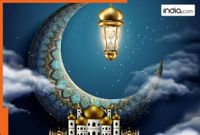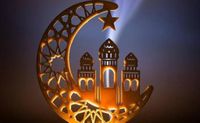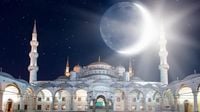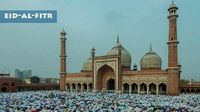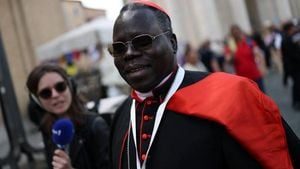As the holy month of Ramadan approaches its conclusion, millions of Muslims around the world are eagerly anticipating the arrival of Eid-ul-Fitr, the joyous festival marking the end of this sacred time of fasting and prayer. In 2025, the festival is set to take place on either March 31 or April 1, depending on the sighting of the crescent moon.
This year, Ramadan began in India on March 2, following the sighting of the crescent moon on March 1. Eid celebrations hinge on this lunar observation, with the potential for the holiday to fall on March 31 if the moon is sighted on March 30, or April 1 if it is not. Similar patterns are expected across various countries, including Pakistan and Saudi Arabia, where the Islamic calendar guides festive traditions based on lunar cycles.
Throughout the Middle East, including countries like Saudi Arabia, the UAE, Qatar, and Kuwait, preparations for the moon sighting are underway. On the evening of March 29, the 29th day of Ramadan, the Saudi Supreme Court and Moon Sighting Committees will look for the crescent moon after the maghrib prayers. Depending on its visibility, Eid-ul-Fitr will either be celebrated on March 30 or 31.
In Pakistan, Eid is traditionally celebrated a day later than in Saudi Arabia. If the moon is seen on March 30, celebrations will occur the following day; otherwise, Eid will take place on April 1. This festival marks a significant occasion where families come together to feast, wear new clothes, and participate in special prayers.
The significance of moon sighting in determining the date of Eid-ul-Fitr reflects deeply rooted Islamic customs. "The date of Eid-ul-Fitr depends on the sighting of the crescent moon," state various reports on the upcoming festivities. As communities prepare, joy and excitement fill the air in anticipation of family gatherings and the communal spirit that the festival brings.
Eid-ul-Fitr, which translates to the " Festival of Breaking the Fast," is not merely a celebration; it embodies gratitude and spirituality. The day is filled with charity known as Zakat-ul-Fitr, ensuring that those in need can partake in the joy of Eid. The essence of this practice reminds participants of the community camaraderie integral to the festival.
On Eid morning, Muslims typically perform special prayers at the mosque. "Eid is a time for community camaraderie, family get-togethers, and spiritual rejuvenation," one report emphasizes, capturing the festival's spirit. After prayers, celebrations typically involve extravagant feasts, warm greetings, and shared gifts known as Eidi.
In Saudi Arabia, a special holiday has been declared, with four days off from March 30 to April 2. The UAE will also observe a three-day holiday from Shawwal 1 to 3, while Qatar and Kuwait follow suit with holiday announcements of up to nine days, depending on the moon sighting. This extends the festive atmosphere and allows families ample time to celebrate.
As anticipation builds globally, the unity and gratitude emphasized during Ramadan carry through to Eid-al-Fitr. The festival is a time for individuals to reflect on what they are thankful for while connecting with family and friends. Streets are adorned with decorations, as excitement envelops communities in preparation for the grand celebrations.
Food plays a vital role in Eid festivities, with traditional dishes evoking memories and enhancing joyous gatherings. Households filled with relatives cooking together create a warm atmosphere, whether through sharing sheer khurma in South Asia or enjoying maamoul pastries in the Middle East. This variety in dishes offers a glimpse into the rich cultural tapestry woven through the Islamic world.
Eid-ul-Fitr is a universal celebration, with millions of Muslims trusting in the unity of their faith and community. Whether celebrated in homes, parks, or lavish restaurants, the essence remains the same: a time to express gratitude, love, and compassion. As the moon sighting draws ever closer, devotees pray for a clear view of the crescent moon to commence the celebrations.
As communities worldwide prepare to gather, they also hold onto the virtues imparted during Ramadan—sharing, caring, and giving back—making Eid-ul-Fitr a beautiful culmination of the month-long observance of fasting, prayer, and reflection. Uniting through their faith, Muslims around the globe look forward to enjoying a bright and prosperous future through the celebration of Eid.
